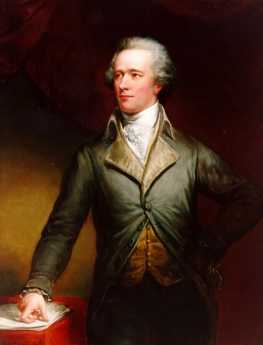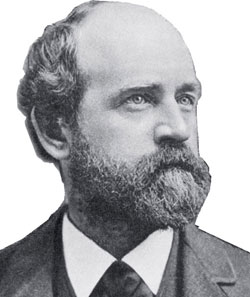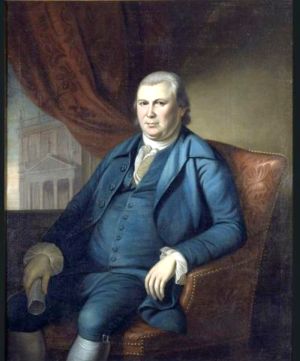Related Topics
Robert Morris: The Dark Side
The richest man in America suddenly was locked in debtor's prison, $12 million in debt. While in prison, he reduced that to $3 million, and got released under a new bankruptcy law he helped devise.
Right Angle Club 2012
This ends the ninetieth year for the club operating under the name of the Right Angle Club of Philadelphia. Before that, and for an unknown period, it was known as the Philadelphia Chapter of the Exchange Club.
Robert Morris, Land Speculator

|
| Alexander Hamilton |
IN 1782, Robert Morris the Superintendent of Finance of the United States, produced a paper called "On Public Credit", which was the model for Alexander Hamilton's more famous paper with the same name. His interest in the topic almost surely grew out of the idea of selling America's abundant land to finance the Revolutionary War. It was obviously a tempting idea, but a fairly unworkable one under wartime conditions, particularly since the great abundance of American land depressed its price for long-term speculators, compared with European land. A price of fifteen or twenty cents an acre required huge parcels of land to justify the problems associated with deriving a profit from it as an intermediary, and created a myriad of other problems dealing with the end user; in 1782 it just wouldn't work.

|
| Henry George |
By 1792 it was perhaps workable because the boundaries of the nation were more clear, but generated the problems of a rolling frontier, associated with steep and volatile differentials of price and safety. If the end user was an impoverished immigrant, the seller was necessarily tangled in protracted periods of refinancing. The issues of slave territory and free territory close by generated local peculiarities of land use and optimum parcel size. Those who gave close attention to the complexities of the novel situation could see the close relationship between the credit of the nation, and the value of its land mass, the ultimate definition of what the nation really was. Thus in time, the single tax idea of Henry George would be an idea that kept coming up for discussion, long before Henry George popularized the concept of placing all taxes on immobile land. The nation was the land it owned, and the land couldn't move. So Morris and Alexander Hamilton wrestled with devising ways to base the credit of the nation on its land wealth, without the complexities of doing so directly. In 1782 such ideas were only dreams, but by 1792 a clever person might work out ways to manage it.

|
| Robert Morris |
As the opportunities of suddenly having undisputed ownership of most of a continent began to clarify, Morris was rearranging his own life. He had accomplished most of his vision of what the nation should be like and had resolved his internal conflicts about the meaning of being a patrician in a democracy, by selling off his business. No matter how strange it may seem to us that being a shipping merchant was disrespectable, while real estate speculation was an acceptable gentleman's occupation, that was apparently how he saw it. His many associations put him in contact with many opportunities, and soon he acquired the parcel of land in upstate New York abandoned by the exterminated Iroquois. Generally called the Genesee territory, the combination of smallpox and General Sullivan's famous march had greatly reduced the tangled arguments about the title to the land, and the sales went very well, netting him roughly $350,000 unadjusted for inflation. If Morris had quit the business right then and there, he had a fair chance of living the rest of his life among the richest men in America.
Lest the impression persist that Morris got into financial difficulty entirely by real estate speculation, a letter he wrote to Gouverneur in 1790 celebrating the Genesee agreement exulted, "This bargain will not only be the means of extricating me from all the embarrassments in which I have become involved, but also the means of making your Fortune and mine."
In 1794 the Asylum Co. was founded by U.S. Senator Robert Morris and John Nicholson, Pennsylvania Comptroller General, to develop and sell lands in northeastern Pennsylvania. Although it was rumored that Marie Antoinette was to be housed in the 1600 acres on the North branch of the Susquehanna River near the present Towanda, she had actually already been executed in late 1793. In 1795 Nicholson succeeded to Morris' interest, and three years later Morris was put in debtor' prison. In 1802, Napoleon invited all French emigrants to come home, and only a few stayed behind in Azilium. The Asylum Co. soon dissolved.
REFERENCES
| Robert Morris: Financier of the American Revolution: Charles Rappleye: ISBN-10: 1416570926 | Amazon |
Originally published: Saturday, November 05, 2011; most-recently modified: Wednesday, June 05, 2019